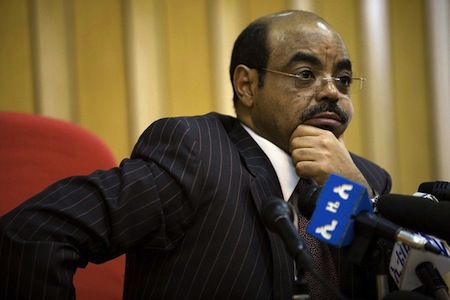The prime minister of Ethiopia, Meles Zenawi, has died after a long illness. He was 57. Deputy prime minister Haile-Mariam Desalegne will be sworn in as acting prime minister.![]()
Since taking power in 1991, Ethiopia really hasn’t known a leader in the post-Cold War era other than Meles. He inherited a country decimated from a grinding famine in the 1980s and a war with Eritrea (that resulted in Eritrea’s independence in 1991) and transformed it into a stable regional power in a country that’s relatively untouched by the colonial experience, but which is the second-most populous African nation after Nigeria.
Meles’s death comes just days after the death of the patriarch of the Ethiopian Orthodox church, Abune Paulos, at age 77, who was himself appointed by Meles.
Meles came to power after participating in the coup that removed Mengistu Haile Mariam, a leader of the Derg that governed Ethiopia from 1974 to 1987 — Mengistu ruled in his own right through 1991. He presided over the writing of a new federalism-based constitution for Ethiopia in 1994, and he kind of opened Ethiopia to the ritual of regular elections, however rigged in favor of Meles.
In his last election in 2010, Meles and his Revolutionary Democratic Front (EPRDF, or የኢትዮጵያ ሕዝቦች አብዮታዊ ዲሞክራሲያዊ ግንባር) won the majority in the Ethiopian parliament, despite widespread allegations of fraud. His victory in the relatively fairer 2005 election was met with massive — and sometimes violent — protest, which Meles met with a general crackdown on political dissidents. For all the stability that Meles brought to Ethiopia, democratic norms and institutions were not among his chief reforms. For example, opposition leader Birtukan Medeksa was imprisoned from 2007 to 2010.
But Meles can certainly be credited with taking steps to strengthen Ethiopia’s economy — it has grown fantastically since Meles came to power, but for two blips in 1998 and in 2003. Last year saw the lowest GDP growth since 2004, but it still managed to top 7%. Ethiopia’s significant growth belies its horrific starting point as one of the poorest countries on the planet — its GDP per capita is just barely over $1,000.
Ethiopian-Eritrean relations are better than they once were, but a full-scale war from 1998 to 2000 resulted in massive casualties for both sides, just as both were emerging from the horror of the decades-long war of Eritrean independence.
Furthermore, Meles has been accused of human rights violations and persecution with respect to the Oromo people of southern and central Ethiopia that constitute the largest ethnic group in the country (34.5%, to 26.9% that are Amhara, and 6% each which are Somali and Tigray).
At the same time, Meles brought Ethiopia within the ambit of the top African allies of the United States — in 2006, Ethiopia launched a war with Somalia seen as somewhat of a proxy war on behalf of the United States to destabilize the Islamic government in Somalia at the time, which was thought to be harboring suspected Islamic terrorists. The key U.S. worry in the post-Meles era will be that the lack of a clear successor could destabilize Ethiopia in the way that Islamists have otherwise destabilized Somalia and parts of Eritrea in the Horn of Africa.
So what next for Ethiopia? Meles had pledged to step down in 2015, but there’s no immediate successor waiting in the wings within the EPRDF, including from the Tigray People’s Liberation Front (the TPLF, ሕዝባዊ ወያኔ ሓርነት ትግራይ,), the Meles-led group that, in turn, dominates the EPRDF.
OpenDemocracy featured a detailed piece earlier this month on possible scenarios for Ethiopia after Meles that foresees a gloomy short-term future:
If history is anything to go by, it will be hard to find a peaceful and orderly route to succession. The Ethiopian people know this, moulded as they are by their own history. On the surface, it’s “business as usual”, the government governs and people go about their daily affairs as usual. But under the surface there is an extremely heavy atmosphere, with an overwhelming feeling that this is just the calm before the storm.
A majority Christian nation, one-third of the 85 million-strong population of Ethiopia is Muslim, many of whom are also Oromo — they will now expect to play a larger role in Ethiopian civil society, after years of the Meles regime that appeared to favor the Amhara and Tigray ethnicities.
In addition to Desalegne, the acting prime minister, who had served as deputy prime minister and foreign minister since 2010, other potential long-term successors include:
- Berhane Gebrekristos, a diplomat and de facto leader of the TPLF,
- Tewodros Adhanom, health minister who was close to Meles,
- Azeb Mesfin, Meles’s widow, a member of parliament, and a member of the nine-person executive committee of the EPRDF,
- Neway Gebreab, adviser to Meles on economic matters,
- Samora Yunus, commander in chief of the armed forces,
- Getachew Assefa, head of the security apparatus,
- Abay Woldu, president of Tigray state, and
- Arkebe Equbay, the former mayor of Addis Ababa.
Photo credit to Irada Humbatova of Reuters.

One thought on “Ethiopia’s Meles Zenawi has died”